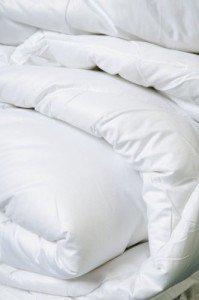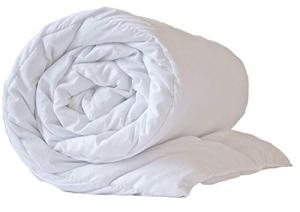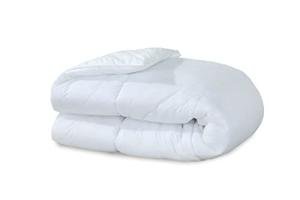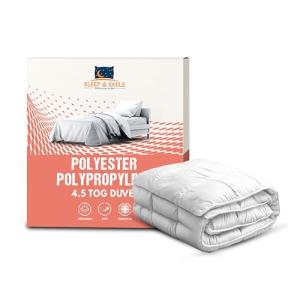As the summer months roll in, many individuals begin the search for the ideal bedding solution that promises both comfort and relief from allergens. An anti-allergy double duvet offers a practical solution to those seeking restful sleep without the bothersome symptoms often triggered by dust mites, pollen, and other allergens. This guide delves into the benefits of anti-allergy duvets, their features, and tips for choosing the best one for summer comfort, ensuring that readers are well-informed to make favorable choices for a restful night's sleep.
Understanding Anti-Allergy Duvets
Anti-allergy duvets are specially designed bedding products that help to reduce the risk of allergy-related issues. These duvets are typically made from materials that inhibit the growth of allergens such as dust mites, mold, and bacteria. With summer approaching, the importance of selecting bedding that promotes a comfortable sleep environment, while minimizing allergic reactions, becomes even more pronounced.
Key Features of Anti-Allergy Duvets
- Hypoallergenic Materials: They are crafted from materials that resist allergens. Common materials include synthetic fibers, polyester, and natural fibers such as bamboo or silk.
- Breathability: Good airflow is crucial in summer months, enabling heat to escape and ensuring a cooler sleeping environment.
- Easy Maintenance: Many anti-allergy duvets are machine washable, making them easy to clean and maintain.
- Moisture-Wicking Properties: These duvets often feature moisture management technology that helps keep the duvet dry and fresh, limiting the growth of mold.
- Lightweight Design: Summer-friendly duvets tend to be lighter than their winter counterparts, promoting comfort without excessive weight.
Benefits of Using Anti-Allergy Duvets
Using an anti-allergy duvet during the summer can offer several advantages that contribute to better sleep quality, including:
- Reduced Allergy Symptoms: Minimizing exposure to allergens can significantly reduce symptoms like sneezing, coughing, and itchy skin.
- Improved Sleep Quality: A comfortable, allergen-free sleep environment may lead to more restful sleep, enhancing overall well-being.
- Versatility: These duvets can often be used year-round, providing comfort irrespective of the season.
- Durability: Many anti-allergy duvets are designed for longevity, maintaining their protective qualities over time.
Factors to Consider When Choosing an Anti-Allergy Duvet
When selecting an anti-allergy double duvet for summer comfort, it is essential to consider the following factors:
- Material:
- Opt for breathable materials like cotton or bamboo that allow for ventilation during warmer months.
- Fill Type:
- Look for synthetic fill options that offer hypoallergenic properties and are lightweight without sacrificing warmth.
- Weight:
- Choose a lightweight duvet that provides comfort without trapping excessive heat.
- Care Instructions:
- Ensure that the duvet is machine washable for easy maintenance and cleanliness.
- Size:
- Verify that the duvet fits appropriately in the duvet cover and is suitable for your bed’s dimensions.
Comparison Table: Popular Anti-Allergy Duvets
| Duvet Model | Material | Fill Type | Weight | Care Instructions | Price Range |
|---|---|---|---|---|---|
| Cozy Comfort Pro | Microfiber | Polyester | Lightweight | Machine washable | £50-£100 |
| Allergy Shield Duvet | Bamboo | Hollowfibre | Medium | Washable at 60°C | £70-£120 |
| Summer Breeze Duvet | Cotton | Microfibre | Lightweight | Machine washable, tumble dry | £40-£90 |
| Sleep Well Duvet | Synthetic | Polyester | Ultra-light | Wash at 40°C | £60-£110 |
Caring for Your Anti-Allergy Duvet
Proper care and maintenance can extend the life of an anti-allergy duvet while maximizing its effectiveness. Here are some guidelines:
- Regular Washing: Wash the duvet regularly, ideally every 1-3 months, depending on usage.
- Drying: Ensure that the duvet is thoroughly dry after washing to prevent mold growth.
- Air Out: Occasionally airing out the duvet can help reduce any musty odors and refresh the material.
- Use Duvet Covers: Protect the duvet with a cover that can be washed frequently, reducing direct exposure to allergens.
FAQs About Anti-Allergy Duvets
1. Can anti-allergy duvets prevent all allergies?
- While anti-allergy duvets significantly reduce exposure to common allergens, they may not completely eliminate allergy symptoms for everyone. It is recommended to pair the duvet with other allergy-reducing measures, such as regular cleaning and using air purifiers.
2. Are anti-allergy duvets suitable for people with sensitive skin?
- Yes, most anti-allergy duvets are designed to be gentle on sensitive skin, especially those made with natural fibers. Always check the materials used to ensure they meet your needs.
3. How often should I wash my anti-allergy duvet?
- It is recommended to wash the duvet every 1 to 3 months, but it may vary based on personal usage. In regions with high pollen counts, more frequent washing might be beneficial.
4. Do anti-allergy duvets feel different from regular duvets?
- Anti-allergy duvets may feel slightly different due to their specialized filling and materials. Many are designed to be just as comfortable as standard options while providing added health benefits.
Choosing an anti-allergy double duvet can make a significant difference in achieving summer comfort, particularly for allergy sufferers. By understanding their features, benefits, and maintenance needs, individuals can select the perfect duvet that caters to their specific requirements. With the right anti-allergy duvet, restful nights and rejuvenating sleep are within reach, allowing everyone to embrace the joys of summer without the burden of allergens.







